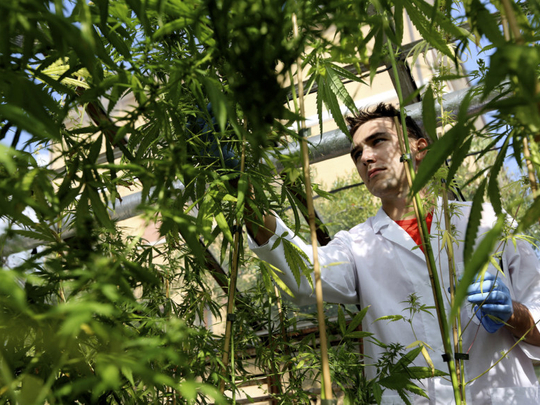
Milan: In Italy, as in most of western Europe, medical cannabis is legal. What sets the country apart is that cultivation of the plant is a de facto army monopoly.
The only place cannabis can be legally grown here is at a heavily guarded military facility in Florence where, this year, two greenhouses produced a yield of about 100kg.
“We do everything in-house,” said the facility’s director, Col. Antonio Medica. “We grow the plants, harvest them, dry and grind the leaves, sanitise the final product with gamma rays, then ship it to pharmacies and hospitals.”
Now the army’s involvement in the therapeutic marijuana business is set to expand. Under a new budget law moving through Parliament, the cannabis programme at the Military Chemical Pharmaceutical Plant is to receive an additional $2 billion (Dh7.35 billion) in public funding. If the bill is approved as anticipated, military officials say, they expect production to triple within a year.
The bill will also make medical cannabis free for all patients, with the cost covered by the government. Until now, local governments have covered the cost in just 11 of Italy’s 21 provinces.
Not everyone is happy with the army’s role, however. Some say they believe that even with the new funding, the quantity and the quality of Italian-grown cannabis will fall short.
Italy legalised cannabis for medical use in 2007, with many caveats. To grow the plant legally requires special authorisation from the Health Ministry’s narcotics office, which means dealing with the country’s infamous bureaucracy. As a result, no private entrepreneur managed to set up a business, and the drug had to be imported, making it prohibitively expensive.
Since access to medical care here is considered a constitutional right, in 2014 the government assigned the task of growing medical-grade cannabis to the military.
One difficulty is that the army makes only one strain of cannabis, called FM2, which is low in THC, one of marijuana’s main active substances, when compared to imported strains.
Andrea Trisciuglio, a 39-year-old multiple sclerosis patient from Foggia in southern Italy, said he has been using medical marijuana for 10 years to mitigate his symptoms but has found the local supply ineffective. “I have to use Bedrocan” — a variety of cannabis with about 22 per cent THC, compared to FM2’s 8 per cent.
The trouble with importing cannabis from the Netherlands is that it “is expensive, which also makes it slow,” said Carlo Valente, a lawyer in the southern city of Lecce who is representing Trisciuglio and other patients.
According to an investigation by the magazine Internazionale, imported cannabis can cost up to $84 a gram. By contrast, the army-produced cannabis costs $7 a gram, Medica said. “We are a non-profit.”
But the home-grown product has other shortcomings. Critics say the army lacks the capability to produce all the therapeutic cannabis that Italy needs. National consumption of the drug is between 400kg and 450kg a year, according to military estimates. This means that even if the military succeeds in tripling its annual production to the anticipated 300kg, it will not meet the country’s need, and imports from the Netherlands will still be necessary.
— Washington Post












